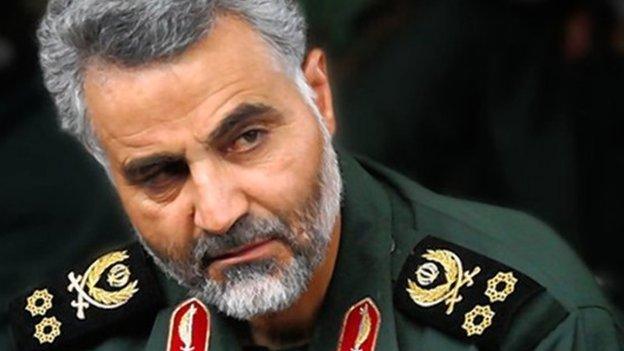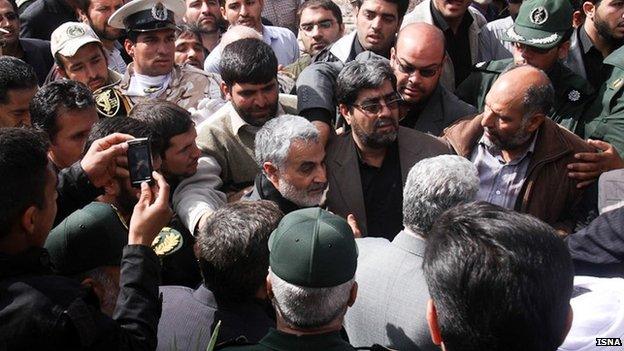General Qasem Soleimani: Iran’s rising star
- Published

Switch on the television in Iran these days and it won't be long before you see General Qasem Soleimani.
The once reclusive head of the Revolutionary Guards' elite Quds Force has emerged from a lifetime in the shadows directing covert operations abroad, to achieve almost celebrity status in Iran.
The man who, until a couple of years ago most Iranians would not have recognised on the street, is now the subject of documentaries, news reports and even pop songs.
One music video, external widely shared in Iran was made by Shia militia fighters in Iraq. It shows soldiers spray-painting the general's portrait on a wall and parading in front of it while stirring music plays in the background.
The general himself is currently in Salahuddin province in northern Iraq, commanding Iraqi and Shia militias as they try to recapture the city of Tikrit from Islamic State (IS).
Iran's Fars News agency has published photographs of him with the troops, and militia sources in Iraq have told BBC Persian he has been there for some time helping the Iraqis prepare for the mission.
It is not the first time Gen Soleimani has faced the jihadists.
In neighbouring Syria he is widely credited with delivering the strategy that has helped President Bashar al-Assad turn the tide against rebel forces and recapture key cities and towns.
Iran has always denied deploying boots on the ground in Syria and Iraq, but every now and then holds public funerals for security forces and "military advisers" who were killed in these two countries.
Qasem Soleimani has made a point of attending some of these ceremonies.
Behind the scenes
Iran and the United States may be arch-enemies on the ideological front, but the IS offensive in Iraq has led to indirect co-operation between the two.
It's a path Gen Soleimani has trodden before.
In 2001, Iran provided military intelligence to the US to support its invasion to overthrow the Taliban in Afghanistan, and in 2007 Washington and Tehran sent representatives to Baghdad for face-to-face talks over the deteriorating security situation there.

Gen Soleimani has risen to prominence directing the counter-offensive against IS in Iraq
Back then former Iraqi Prime Minister Nouri Maliki was battling spiralling sectarian violence.
In an interview for a BBC Persian documentary two years ago, former US ambassador to Iraq Ryan Crocker recalled the crucial behind-the-scenes role played by Gen Soleimani in the Baghdad talks.
"[Iran's ambassador to Iraq] called repeatedly for breaks," he said.
"I couldn't quite figure out why, and then later discovered that whenever I said something that he didn't have covered in his points, he would need to call back to Tehran for guidance - he was that tightly controlled. On the other end of the phone was Qasem Soleimani."
Mr Crocker also felt Gen Soleimani's influence when he served as US ambassador to Afghanistan.
"My Iranian interlocutors on Afghanistan made clear that while they kept the foreign ministry informed, ultimately it was Gen Soleimani that would make the decisions," he told the BBC.
Over the last few years, Gen Soleimani's role in Iran's foreign affairs has become more public.
He is no longer the hidden figure at the end of the phone line.
These days he is the proud face of Iran, the go-to man when a crisis happens.
Barbed criticism
Last month at the prestigious Fajr Film Festival in Tehran one of the winners dedicated his award to Gen Soleimani.
It was even announced that he would be one of the supervisors in the production of a new film Iran is making about his old adversary Saddam Hussein.
But not everyone is happy about the general's meteoric rise.
In December 2014 at the Manama Dialogue security summit, there was a sharp exchange of views between Canadian and Iranian participants over the role of Gen Soleimani.
Canada's then-foreign minister, John Baird, branded him an "agent of terror in the region disguised as a hero" fighting IS.
Iran's former nuclear negotiator Hassan Mousavian rose to the defence, accusing the minister of "spending time in palaces and luxury hotels while General Soleimani has risked his life to fight against IS terrorists".
Inside Iran a campaign has started among conservative bloggers for Gen Soleimani to go into politics. They have dubbed him Iran's most honest and least corrupt politician and are calling for him to put his uniform aside and stand for president in 2017.
Even the first deputy speaker of the Iranian Parliament has lent his support.
"His political analysis is no less than the Iranian Supreme Leader or Hassan Nasrallah, head of the Lebanese Hezbollah," said Mohammad-Reza Bahonar three months ago.
But not all Iranians share the enthusiasm.
Some political activists are deeply worried at the prospect of the Revolutionary Guards taking control of the presidential palace.
They point to Egypt where the military have reasserted control, warning that the general now fighting Islamic State could turn out to be the "al-Sisi" of Iran.